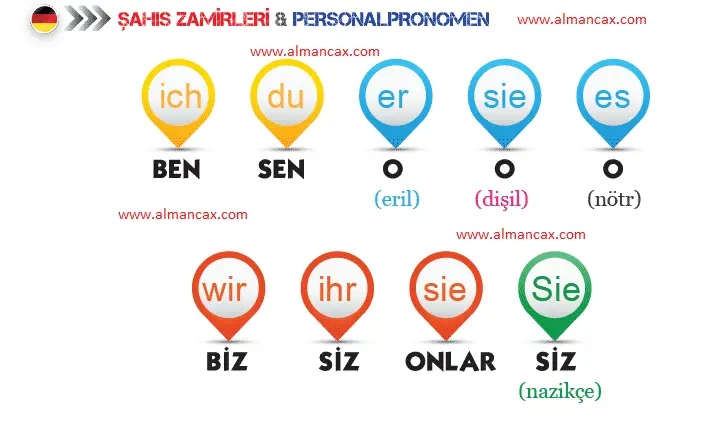Bu dersimizde Almanca şahıs zamirleri adlı konuyu inceleyeceğiz. Almanca Ben sen o ve biz siz onlar şeklinde bildiğimiz Almanca şahıs zamirleri, özel veya cins isimlerin yerine, onlara uygun olarak kullanılan kelimelerdir. Almanca kişi zamirleri olarak da bilinir. Şahıs zamiri ile kişi zamiri aynı şeydir.
Almanca şahıs zamirleri, Almanca kişi zamirleri
İçindekiler
Almanca şahıs zamirleri ile Almanca kişi zamirleri ifadeleri aynı şeydir arkadaşlar, kafanız karışmasın. Biz her ikisi de aynı ifade olduğunu anlatmak için yukarıdaki başlığa o şekilde yazdık. Almanca şahıs zamiri ile Almanca kişi zamiri aynı şeylerdir. Yani Şahıs zamiri = Kişi zamiri demektir.
Ancak bir başka zamir türü olan iyelik zamirleri ile karıştırmayın. İyelik zamirleri farklıdır. İyelik zamirleri aynı zamanda sahiplik zamirleri olarak da bilinir ve şahıs zamirleri ile iyelik zamirleri birbirinden farklıdır. Almanca şahıs zamirleri ben-sen-o (ich-du-er) gibi kelimelerdir, Almanca iyelik zamirleri ise benim-senin-onun (mein-dein-sein) gibi kelimelerdir.
Almanca iyelik zamirleri hakkında bilgi edinmek isterseniz hemen alta Almanca iyelik zamirleri dersinin linkini bıraktık.
Tavsiye konusu : Almanca iyelik zamirleri
Almanca kişi zamirleri tıpkı Türkçemizde olduğu gibi genellikle bir cümlenin öznesi konumundadırlar. Bu nedenle Almanca şahıs zamirlerini iyice öğrenmek gerekir. Türkçe’de şahıs zamirleri ben, sen, o, biz, siz, onlar sözcükleridir. Türkçe’de sadece bir tane “o” zamiri olduğundan, kendisinden bahsettiğimiz şey ister erkek cins olsun, ister dişi cins olsun, ister cinsiyetsiz olsun üçü için de “o” zamirini kullanırız.
Biz Türkçe’de insanlar için de O zamirini kullanırız, hayvanlar için de O zamirini kullanırız, cansız varlıklar veya eşyalar için de O zamirini kullanırız. Fakat Almanca zamirlerde “o” zamirinin karşılığı erkek, dişi ve cinsiyetsiz isimler için ayrı ayrıdır. Örneğin; biz Türkçe’de “o” zamirini hem bay, hem bayan, hem de cansız varlıklar için kullanabiliriz.
Örneğin “kitabı görüyorum” cümlesi yerine “onu görüyorum” diyebiliriz, Almanca’da da bunu söyleyebiliriz ancak bu cümledeki “onu” zamiriyle kastettiğimiz şeyin cinsiyetine göre er-sie-es zamirlerinden uygun olanı kullanmamız gerekir. Almanca şahıs zamirlerinde erkek cins isimler için er zamiri, dişi cins isimler için sie zamiri, cinsiyetsiz isimler için es zamiri kullanılır.
Kişilerden veya özel isimlerden bahsederken de şahsın cinsiyetine göre er-sie-es zamirlerinden biri kullanılır. Erkekler için er zamiri, kadınlar için sie zamiri kullanılır. Mesela Muharrem, Ömer, Samet erkek ismi oldukları için onların yerine er zamiri kullanılır. Zeynep, Melis, Meryem kadın ismi oldukları için onların yerine sie zamiri kullanılır. Cinsiyetsiz varlıklar için es zamiri kullanılır. Bir başka deyişle; artikeli der olan isimlerin yerine “er”, artikeli die olan isimlerin yerine “sie”, artikeli das olan isimlerin yerine “es” zamiri kullanılır. Görüldüğü gibi Almanca şahıs zamirlerinin kullanımı Türkçe şahıs zamirlerinin kullanımından biraz daha farklıdır.
Almanca Şahıs Zamirleri
İlk olarak Almanca şahıs zamirlerini ve Türkçelerini bir tablo halinde verelim. Aşağıdaki tabloda Almanca şahıs (kişi) zamirleri yer almakta olup tablonun altında gerekli açıklamalar mevcuttur. Dikkatle inceleyiniz.
| Almanca Şahıs Zamirleri | |
|---|---|
| ich | Ben |
| du | Sen |
| er | O (eril) |
| sie | O (dişi) |
| es | O (nötr) |
| wir | Biz |
| ihr | Siz |
| sie | Onlar |
| Sie | Siz (Nazik hitap) |
Yukarıdaki tabloda Almanca şahıs zamirleri ve Türkçe karşılıkları verilmiş olup tabloda görüleceği üzere üç adet sie zamiri dikkatinizi çekmiş olmalı. Bu zamirler hakkında detaylı bilgi dersimizin devamında mevcuttur. Almanca şahıs zamirleri başlıklı bu dersimizi dikkatle okumaya devam ediniz.
Almanca Şahıs Zamirlerini topluca bir görsel olarak gösterelim:
Almanca şahıs zamirleri ile ilgili olarak değinmemiz gereken diğer bir husus ise; yukarıda da görüldüğü gibi sie zamiri üç kez yazılmıştır. Birinci sie zamiri az önce de değinmiş olduğumuz üçüncü tekil şahıs olan o zamiridir. Diğer küçük harfle başlayan sie ise üçüncü şahıs zamirinin çoğulu olan Türkçe’deki onlar zamirinin karşılığıdır. Sondaki büyük harfle başlayan Sie zamiri ise sen diyemeyeceğimiz şahıslara nezaketle hitap etmek için kullanılır.
Örneğin, öğretmenimize, müdürümüze, büyüklerimize karşı sen değil siz diye hitap ederiz. Bu amaçla kullanılan Sie zamirinin baş harfi her zaman büyük harfle yazılır. Almanca’da sie zamiri birden çok anlama geldiği için “bunları nasıl ayırt edicez” dediğinizi duyar gibiyiz. Hemen cevaplayalım.
Bir cümlede sie – Sie zamiri gördüğünüzde bu zamirin kimi-neyi kastettiğini anlamak için fiilin çekimine bakarız. Fiilin çekiminden; sie zamirinin “o” anlamında mı kullanıldığını, “onlar” anlamında mı kullanıldığını, yoksa “siz” anlamında mı kullanıldığını anlarız. Zaten nazik hitap amacıyla kullanılan “Sie” zamirinin baş harfi her zaman büyük yazıldığından dolayı, eğer (cümle başında olmadığı halde) “Sie” zamirinin baş harfi büyük yazılıysa o halde nazik hitap amacıyla kullanıldığını kolaylıkla anlarız. Birazdan vereceğimiz örnek cümleleri inceledikçe konuyu daha iyi kavrayacaksınız.
Daha önceki derslerimizde “bu bir kitaptır, bu bir masadır” gibi Almanca basit tanım cümlelerini ve cümle kurmayı öğrenmiştik. Şimdi şahıs zamirlerini de öğrendiğimize göre yine aynı tarzda “Ben bir öğretmenim, sen bir öğrencisin, o bir doktordur” gibi cümleleri kurmayı öğrenelim. Bu cümlelerdeki ben-sen-o kelimeleri birer şahıs zamiridir.
Almanca şahıs zamirlerine bir görsel ile örnek verelim. Aşağıdaki görsel konunun daha iyi anlaşılmasını sağlayacaktır.
Şimdi “Ben bir öğretmenim, sen bir öğrencisin, o bir doktordur” gibi cümleleri kurmayı öğrenelim. Bu cümlelerdeki ben-sen-o kelimeleri birer şahıs zamiridir. Bu tür cümlelerin kurulmasında tıpkı İngilizce’deki gibi (örn: am-is-are) yardımcı fiiller kullanılır. Şimdi Almanca’da kullanılan yardımcı fiilleri ve bu fiillerin şahıs zamirlerine göre çekimlerini görelim.
Aşağıdaki tablonun iyice ezberlenmesi gerektiğini belirtelim. Tablonun yanındaki örnekleri de inceleyiniz. Örnek cümlelerde önce şahıs zamiri sonra yardımcı fiil ve daha sonra bir isim gelmektedir. Bu tür cümlelerin kalıbı bu şekildedir. Tablonun sağında İngilizce’de benzer cümle örneklerine de yer verilmiştir. Aşağıdaki tabloyu dikkatle inceleyiniz.
Almanca Şahıs Zamirleri Örnek Cümleler
Yukarıdaki tabloda en basit hali ile Almanca şahıs zamirleri kullanılarak oluşturulan cümlelere örnekler verilmiştir. Siz de alıştırma yapmak maksadıyla kendi kendinize çok çeşitli cümleler yapabilirsiniz. Ne kadar çok alıştırma yaparsanız Almanca şahıs zamirleri konusunu o kadar çabuk ve kolay öğrenirsiniz.
Almanca şahıs zamirlerini bir kere de tablo halinde verelim, dilerseniz bu sayfanın çıktısını alabilirsiniz.
Almanca Şahıs Zamirleri Okunuşları ve Türkçeleri
| Almanca Şahıs (Kişi) Zamirleri | ||
|---|---|---|
| Almanca | Türkçe | Okunuşu |
| ich | Ben | ih |
| du | Sen | du |
| er | O (eril) | eğ |
| sie | O (dişi) | zi: |
| es | O (nötr) | es |
| wir | Biz | wiğa |
| ihr | Siz | iğa |
| sie | Onlar | zi: |
| Sie | Siz (Nazik hitap) | zi: |
Liste olarak göstermek gerekirse:
Almanca şahıs zamirleri:
- ich : ben (ih)
- du : sen (du)
- er : o (er) (eril cins)
- sie : o (zi:) (dişi cins)
- es : o (es) (nötr cins)
- wir : biz (vir)
- ihr : siz (iğr)
- sie : onlar (zi:)
- Sie : siz (zi:) (nazik hitapta kullanılır)
Değerli arkadaşlar Almanca kişi zamirlerini kısaca toparlayacak olursak, yukarıda görüldüğü üzere Almanca sie zamiri bir kaç farklı anlam taşır. Bu anlamları cümlenin gidişinden veya fiil çekimlerinden vs. çıkarmak mümkündür. Önemli olan şu anda sizin bu kelimeleri iyice belleyip öğrenmenizdir.
Ayrıca yukarıda verilen zamirlerin içinde sadece nazik hitapta kullanılan Sie zamirinin büyük harfle, diğerlenin ise küçük harfle yazıldığını unutmamanız gerekir. Nazik hitabı genelde kendimizden büyük kişilere yada tanımadığımız kişilere hitap ederken kullanırız. Yukarılarda verdiğimiz Almanca şahıs zamirleri ile ilgili örnek cümleleri de güzelce inceleyip öğrenirseniz bu konu hakkında bir sorununuz kalmayacaktır.
Almanca derslerimiz hakkında her türlü soru ve görüşlerinizi almancax forumlarına yazabilirsiniz. Tüm sorularınız almancax eğitmenleri tarafından yanıtlanacaktır.
Kendimizi Sınayalım : Almanca şahıs zamirleri
Almanca şahıs zamirleri nelerdir?
ich : ben
du : sen
er : o (eril cins)
sie : o (dişi cins)
es : o (nötr cins)
wir : biz
ihr : siz
sie : onlar
Sie : siz (nazik hitapta kullanılır)



